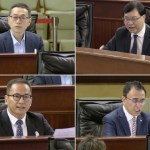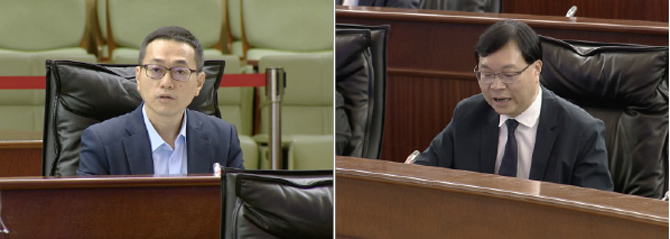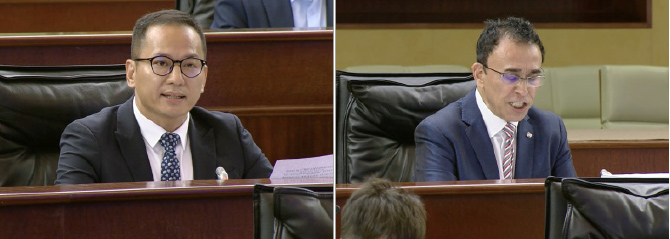A large number of lawmakers have, one way or another, expressed concerns over the situation of local employment as well as future prospects.
Ahead of yesterday’s Legislative Assembly (AL) agenda, lawmakers Leong Sun Iok, Lei Chan U, Leong Hong Sai, Zheng Anting, Lam Lon Wai, Nick Lei, Song Pek Kei, and José Pereira Coutinho submitted separate inquiries to the government, all raising concerns about local employment.
The lawmakers focused particularly on illegal labor, youth unemployment, excess non-resident worker quotas, and the fate of satellite casino employees facing closures by year’s end.
Lawmaker Leong Sun Iok addressed the plenary to call for a review of the labor import policy, aiming to ensure the rights and interests of local workers in accessing employment.
He remarked that, at a time when local universities are hosting their graduation ceremonies, many of the local youngsters do not have job prospects.
“With the new economic situation and the adjustment of the labor market, jobs with good conditions are in high demand, technical requirements are increasingly high, and this is impacted by the importation of non-resident workers (TNR). In these circumstances, even candidates with qualifications and professional experience find it challenging to secure an ideal job, let alone young people who are just starting their careers and have no prior experience,” he said.
Noting the many ineffective measures from the government, particularly in terms of providing opportunities for internships, he urged the authorities to push for the integration of these young workers within large corporations.
“In particular, large companies, gaming operators, banks, and public interest entities should be required to hire locals so that they have more opportunities for employment and professional advancement.”
Concurrently, he said that it is necessary to address the TNR quotas.
“As of April this year, the number of specialized TNRs reached 5,905, so the government has a responsibility to assess the current situation and manage the number of TNRs, as well as to define precise mechanisms for training locals and phasing out TNRs, to gradually return specialized jobs to local workers, achieving the orderly exit of TNRs and assigning good jobs to locals,” he said.
Also expressing similar concerns but oriented toward the jobs of the workers of the 11 satellite casinos that are due to close their doors, Lei Chan U noted the speech of the Chief Executive (CE) Sam Hou Fai during the policy address for this year, when he said that stabilizing employment was a priority for this year.
He noted that, although not drastically, the unemployment and underemployment rates have been growing and that “more than words,” actions are needed to achieve the perceived results.
In turn, Leong Hong Sai also expressed concerns over the satellite casinos’ workers, noting that the process of reintegration and negotiation must be initiated as soon as possible and conducted in a fair and supervised manner to ensure their rights.
The same lawmaker also called for the reinforcement of supervision of illegal work, specifically regarding temporary activities such as events, to not only guarantee local access to jobs but also to maintain a good image of Macau as a cultural destination.
Making the “hat-trick,” Leong Hong Sai also called on the authorities to urgently review the TNR quotas and approve new ones based on scientific criteria.
Lawmaker Zheng also emphasized the employment of youngsters as a priority, noting that there will soon be some 8,000 fresh graduates entering the job market, which has already left behind 50% of those from last year.
“Young people are the cornerstone of social development, and the issue of employment for recent graduates is linked to social stability and economic restructuring. I hope that the government will continue to introduce forward-looking and systematic solutions to expand opportunities for young people to develop,” he said.
In his turn, Lam Lon Wai noted that many younger generation workers looking for a job have resorted to working for takeaway delivery platforms, jobs that carry significant risks and have recorded many severe accidents in recent years.
He called on the government to regulate these activities to ensure these workers are minimally secured in case of work-related accidents.
Nick Lei recalled the incident at a recent concert when many illegal workers were found by the authorities, calling on the government to act strictly regarding this type of abuse.
He also called on the government to accelerate the many plans that have been announced but have not yet begun, as a way to quickly reduce the unemployment of many workers, particularly those in the construction industry.
Like others before her, lawmaker Song also called for the adjustment of the proportion of TNR, namely those working in the gaming concessionaires.
She wants the ratio of 85% locals enforced by law on the medium and high management levels also to be extended to lower-ranked posts, ensuring that more locals can access job postings.
She also claimed that the policy of labor import has been in place for over 20 years and has not been adjusted to the current reality, urging authorities to review this law, taking as a reference the example of Singapore, which sets a ceiling of TNR for each sector.
Pereira Coutinho also aired strong words on the case of illegal workers. The lawmaker noted the relevance of this finding, which aligns with the numerous warnings that authorities had long chosen to ignore.
According to Pereira Coutinho, he has been receiving many complaints from workers in the MICE sector who claim that many illegal workers are performing tasks in this sector.
Categorizing the finding of the illegal workers in a concert venue as a “scandal,” he noted that the fact this happened inside the facilities of a gaming operator and in an international level event, “affected the image of Macau at the regional and international levels because it involved concerts with international celebrities.”
He claims that the government should “investigate all responsibilities, raise the level of professionalism in the internal management of the gaming concessionaire in question, and implement concrete measures to prevent similar scandals from recurring.”
He added that the incident highlighted the labor authorities’ inaction and lack of oversight, noting that the event organizers had publicly posted detailed job advertisements on social media – including the roles, purpose, and compensation – yet no preventative measures were taken by the authorities to address or halt the illegal hiring.
Related


